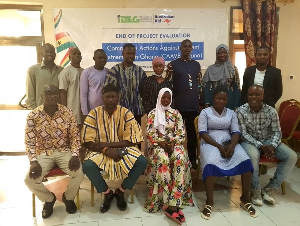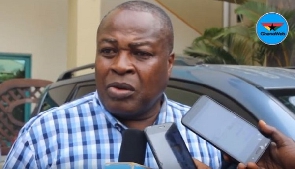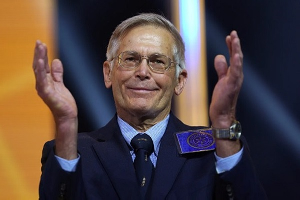The Institute for Democratic Governance (IDEG) has held an evaluation meeting for the implementation of a project aimed at preventing violent extremism in the country.
The evaluation forum, which was held in Wa on Saturday, December 21, 2024, was organised to assess the impact of the project named Community Action Against Violent Extremism (CAAVE) in Bole and Wa West districts in the Savannah and Upper West Regions, respectively.
During the engagement, the Bole and Wa West groups were tasked to give feedback on five thematic areas: Community Entry, Townhall and Sensitization, Publicity Materials and Posters, Regional Forum, as well as the challenges faced in the course of their operations.
On the Community Entry, both groups rated the outcome as effective because all stakeholders were involved in the process and were interactive as well, adding that the set target was also attained. On the Townhall and Sensitization aspect, they indicated the outcome was very great since the engagement was educative and sensitization was interactive with all participants and stakeholders contributing to the success of the programme.
While members admitted to publicising and displaying posters as expected at vantage points, on motorbikes, and in marketplaces in the Publicity Materials and Posters evaluation category, they noted that the Regional Forum segment of the CAAVE project ensured gender equality in our governance system.
However, the successes achieved were not without some challenges that came with the implementation of the project.
Some of the challenges the groups highlighted include difficulties in the mobilization of stakeholders and poor timing during Community Entry, over-attendance during Townhall and Sensitization sessions, long travel issues due to the bad nature of roads, and a shortage of working tools at some points in time.
"Actually, there was a heated argument between facilitators and participants on Fulani and farmers, which the explanation actually did not go well with participants. Then there was an issue with the language barrier as well. Then there was no follow-up after the project delivery. We said it because after training, we need to make a follow-up to ensure that the new knowledge acquired is transmitted," Alhasan Seidu, representative of the Bole group, added.
On whether the CAAVE project contributed to peaceful elections in the just-ended polls in those two districts, they indicated that:
"Yes, because in the district through the sensitization, we did not encounter any violent activities before, during, and after the elections. Members of the various communities in the district are now vigilant and always alert. They report issues and unknown individuals to the various stakeholders responsible. They are also enlightened on violent extremism."
Speaking to journalists at the event, the Upper West Regional Coordinator for IDEG, Sidik Watara, giving an overview of the project, said:
"I think the project has made a lot of impact on the lives of these communities. From what we've just heard, you realize that the people of Wa West, the very week that we started this sensitization, took it upon themselves to make sure that they question people that are not known in their communities. Anybody they don't know, that is not familiar, that cannot speak their language fluently, then, they have to question you, what you are doing there.
"So this was replicated in Bole where this assembly member, Hassan, had to drag an unknown person with this questionable character to the police commander, and then he facilitated the deportation of the person back to his community."
According to him, IDEG came up with the Community Action Against Violent Extremism (CAAVE) project with support from the Australian government in order to combat violent extremism within the bordering towns of northern Ghana, especially the Upper West Region and Savannah Region, which are likely to be affected by the spillovers from neighbouring countries that are prone to conflict.
"Having in mind that there are so many communities that share borders with our neighbouring countries, Burkina Faso and Ivory Coast, so these projects targeted the neighbouring bordering communities and we selected communities such as Dabor in the Upper West Region, Wechiau, Bankpama and the other communities. These communities and that of Mandari in the Savannah Region, Bole and Doli, all in the Savannah Region were chosen because of their peculiar nature.
"These communities share boundaries with the neighbouring Ivory Coast and people flow in. And because of the multilingual nature of Bole, because they speak so many languages there, people easily settle there. And people who are violent or have a criminal background can easily locate or reside in these communities. As a result, IDEG thought it wise to select these communities to embark on sensitization with the stakeholders, especially the chiefs, assembly members, and the security forces."
Sidiki charged residents in the catchment areas to embrace the project as their own to ensure its sustainability and to continue to be vigilant and conscious of their surroundings to ward off bad elements since the likelihood of having a regular source of funding could not be guaranteed.
Watch as Jean Mensa addresses issues with 9 constituencies whose results are yet to be declared
Click to view details



Regional News of Tuesday, 24 December 2024
Source: Ilyaas Al-Hasan, Contributor

















